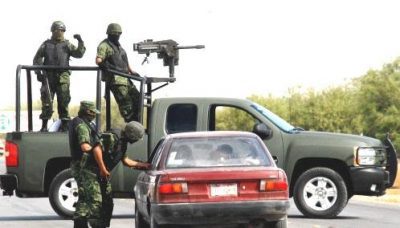Death in Mexico resembles a Civil War: Three Murders Per Hour in early 2017
Sawako Utsumi and Lee Jay Walker
Modern Tokyo Times
The nation of Mexico resembles a nation going through the trauma of a brutal civil war. Yet, the government of Mexico seems at a loss about tackling the ongoing crisis. Hence, in the first four months in Mexico this year, just over 8,700 murders have taken place. This is a remarkable statistic given the reality that no civil war exists in Mexico.
It is estimated that roughly fifty percent of all murders is based on crime related to organized crime syndicates. Sadly, even by terrible murder standards in Mexico, the current killing spree is the highest since prosecutors began to record statistics over two decades ago. In other words, the situation is spiraling out of control because of institutional failures of the state; the belief that life is cheap, issues related to narcotics, and other important factors, for example, the power of crime syndicates.
According to a recent article in the International Crisis Group, “The path to this grisly statistic has advanced through various stages. The first was the militarization of the “war on drugs” that began in 2006 under former President Felipe Calderón, and which triggered an arms race and clashes between criminal organizations and state security forces, including the Mexican army. Then came strategies aimed at taking down “kingpin” cartel leaders and at splintering criminal organizations, both of which ultimately aggravated the violence and reinforced these groups’ ties with corrupt state institutions.”
Internal corruption inside various institutions in Mexico is further eroding confidence in the democratic process because “money talks and buys.” Equally disturbing, a violent vacuum enters the criminal world when the state apparatus attacks syndicates. Indeed, some syndicates have been attacked that appear to favor others. Therefore, political confidence building and institutional reassurances are seen for being empty rhetoric under the prevailing conditions in Mexico.
In 2016 more people were killed in the conflict in Mexico than in the brutal conflicts engulfing Afghanistan, Iraq, and Yemen. Indeed, the total of deaths in Mexico was roughly equal to the combined deaths of Afghanistan and Yemen. This figure is astonishing given the fact that technically Mexico isn’t at war – apart from with itself based on various negative factors.
Individuals who seek to investigate various angles related to crime in Mexico – or focus on collusion within certain institutions face being murdered. The New York Times reports, “Mexico is one of the worst countries in the world to be a journalist today. At least 104 journalists have been murdered in this country since 2000, while 25 others have disappeared, presumed dead. On the list of the world’s deadliest places to be a reporter, Mexico falls between the war-torn nation of Afghanistan and the failed state of Somalia. Last year, 11 Mexican journalists were killed, the country’s highest tally this century.”
President Enrique Peña Nieto, the leader of Mexico, seems aloof to the reality that is besetting Mexico. Given this reality, plans related to anti-corruption, the prevention of crime, reforms related to security forces and the police, and other important areas, seem either redundant or in static mode.
The International Crisis Group says, “In responding to escalating violence, Peña Nieto has failed to make significant changes to legal institutions and the country’s moribund security strategy. On the contrary: the budget for a new crime prevention plan was virtually eliminated last year, implementation of the National Anti-Corruption Strategy has stagnated, and the process of appointing its key officials lacks credibility. Furthermore, the introduction of the accusatory criminal system, established in the wake of a 2008 legal reform bill, has not generated its desired results, while details concerning the creation of a genuinely independent head of the Prosecutor General’s Office (Fiscal General de la República) remain opaque. The role played by the armed forces in providing public security has enabled postponement of much needed reform of the federal and local police, while the push for a new Internal Security Act would provide legal cover to military personnel performing public safety duties that go beyond their mandate and for which they have not been trained.”
Of course, other nations are blighted by high crime rates and issues related to narcotics. Despite this, the crisis in Mexico is spiraling out of control. Therefore, the current figure of three murders per hour in Mexico seems set to continue – indeed, even if the figure falls, it seems that this will be based on crime syndicates rather than the state apparatus.
https://www.crisisgroup.org/latin-america-caribbean/mexico/mexicos-worsening-war-without-name
https://www.nytimes.com/2017/04/29/world/americas/veracruz-mexico-reporters-killed.html
Modern Tokyo News is part of the Modern Tokyo Times group
DONATIONS to SUPPORT MODERN TOKYO TIMES – please pay PayPal and DONATE to sawakoart@gmail.com
http://moderntokyotimes.com Modern Tokyo Times – International News and Japan News
http://sawandjay.com Modern Tokyo Times – Fashion
https://moderntokyonews.com Modern Tokyo News – Tokyo News and International News
http://global-security-news.com Global Security News – Geopolitics and Terrorism
PLEASE JOIN ON TWITTER
https://twitter.com/MTT_News Modern Tokyo Times
PLEASE JOIN ON FACEBOOK

